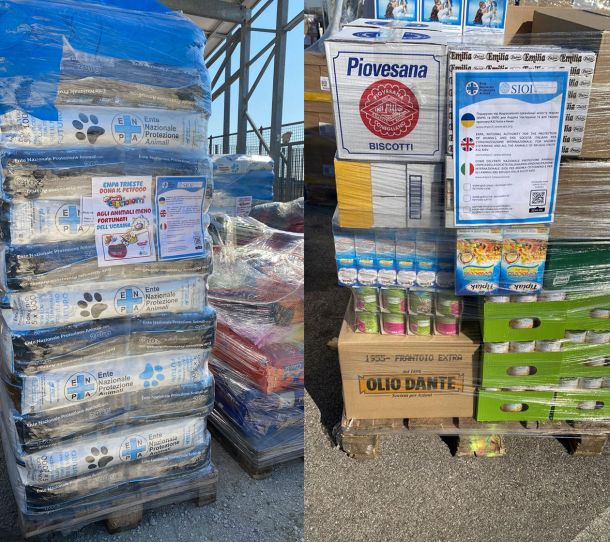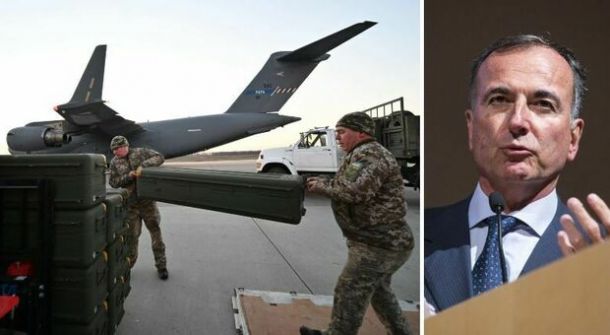- Home
- Archivio
- Politica internazionale
- Moscow: Franco Frattini speaks about modern politics and global threats at RANEPA
Moscow: Franco Frattini speaks about modern politics and global threats at RANEPA

Franco Frattini speaks about modern politics and global threats at RANEPA
On September 13, former Italian Foreign Minister (2004-2008), President of the Institute for Eurasian Studies Franco Frattini delivered a lecture at RANEPA on Important aspects of West-East relations: Challenges and prospects.
The honorable guest was introduced by the Rector of the Presidential Academy, Vladimir Mau. Franco Frattini thanked the students for coming to his lecture. The last time he visited the Academy, he was awarded the RANEPA Doctor Honoris Causa title, the speaker said, adding that he was happy to continue cooperation with the Presidential Academy.
He spoke with the students about the relationship between Russia and the European Union and Russian-Italian relations. He noted that during his tenure as Italian Foreign Minister, relations between the two countries, as well as between Russia and the EU, were at the highest level. Franco Frattini regretted that contacts between Russia and the West are tense now, aggravated by the anti-Russia sanctions. He believes the EU has made a number of mistakes, which eventually led to the crisis.
During his presentation, Mr. Frattini emphasized Russia’s prominent strategic role in promoting the resolution of the Syrian crisis, appreciating its strong presence and results achieved in the fight against terrorism. The speaker noted that while Russia was in Syria and contributed to the fight against terrorism, the EU did not intervene. He also discussed North Africa, including the role of Egypt, and Libya before and after Muammar Gaddafi. According to the speaker, the West should realize there are common interests, and the enemy is not the East or Moscow, but all those “asymmetric threats” such as cybercrime and chemical weapons in the hands of terrorists. We need to confront all these threats together, Mr. Frattini said.
Mr. Frattini’s lecture was organized by the Department of International Regional Studies and Regional Management of RANEPA Institute of Public Administration and Civil Service.
Franco Frattini was awarded the RANEPA Doctor Honoris Causa title by Rector Vladimir Mau in 2018. Also in 2018, he agreed to co-head a new program on International Humanitarian Cooperation (a Russian-Italian program with in-depth study of foreign languages) at the IPACS Department of International Regional Studies and Regional Management.
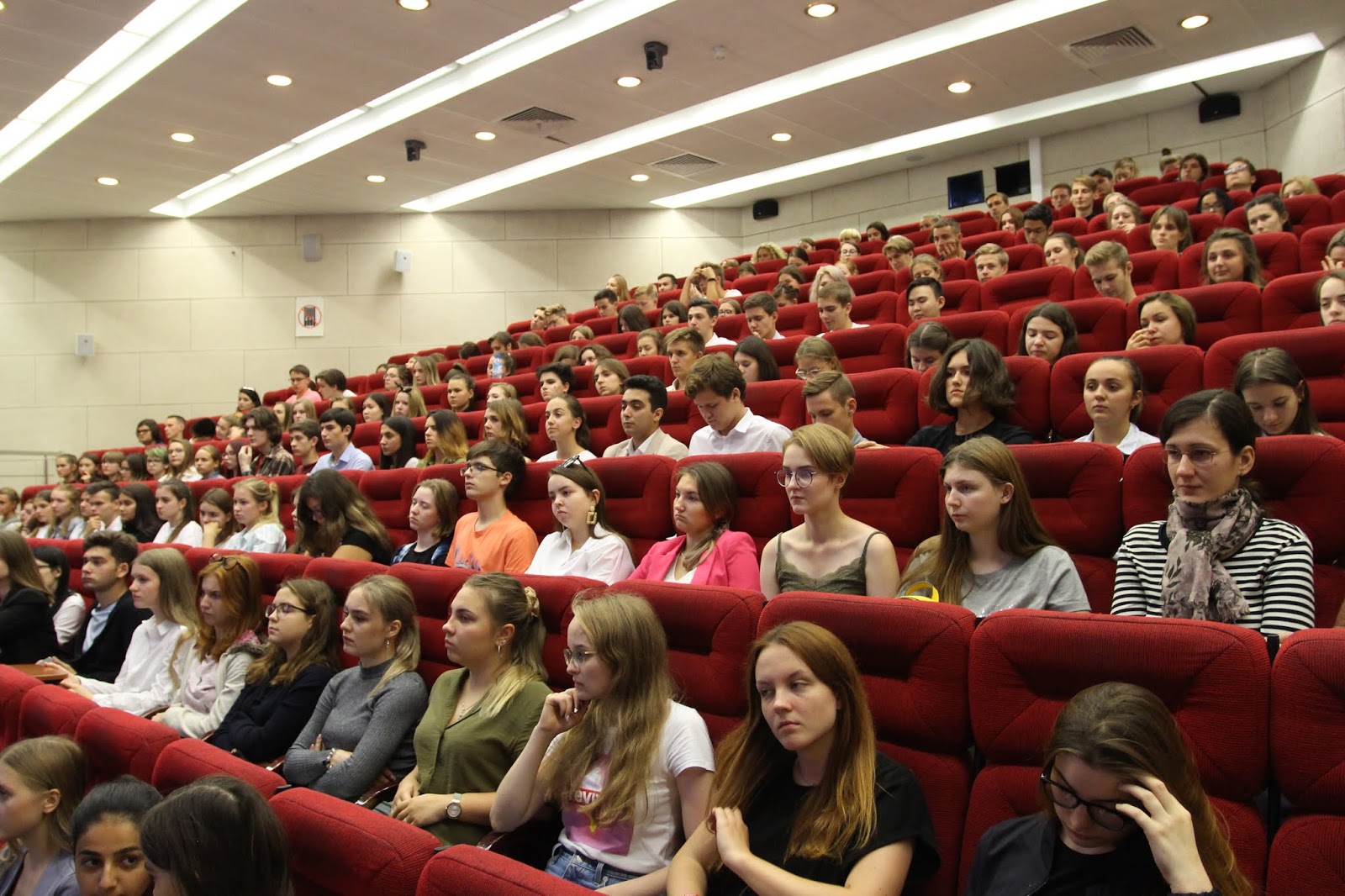
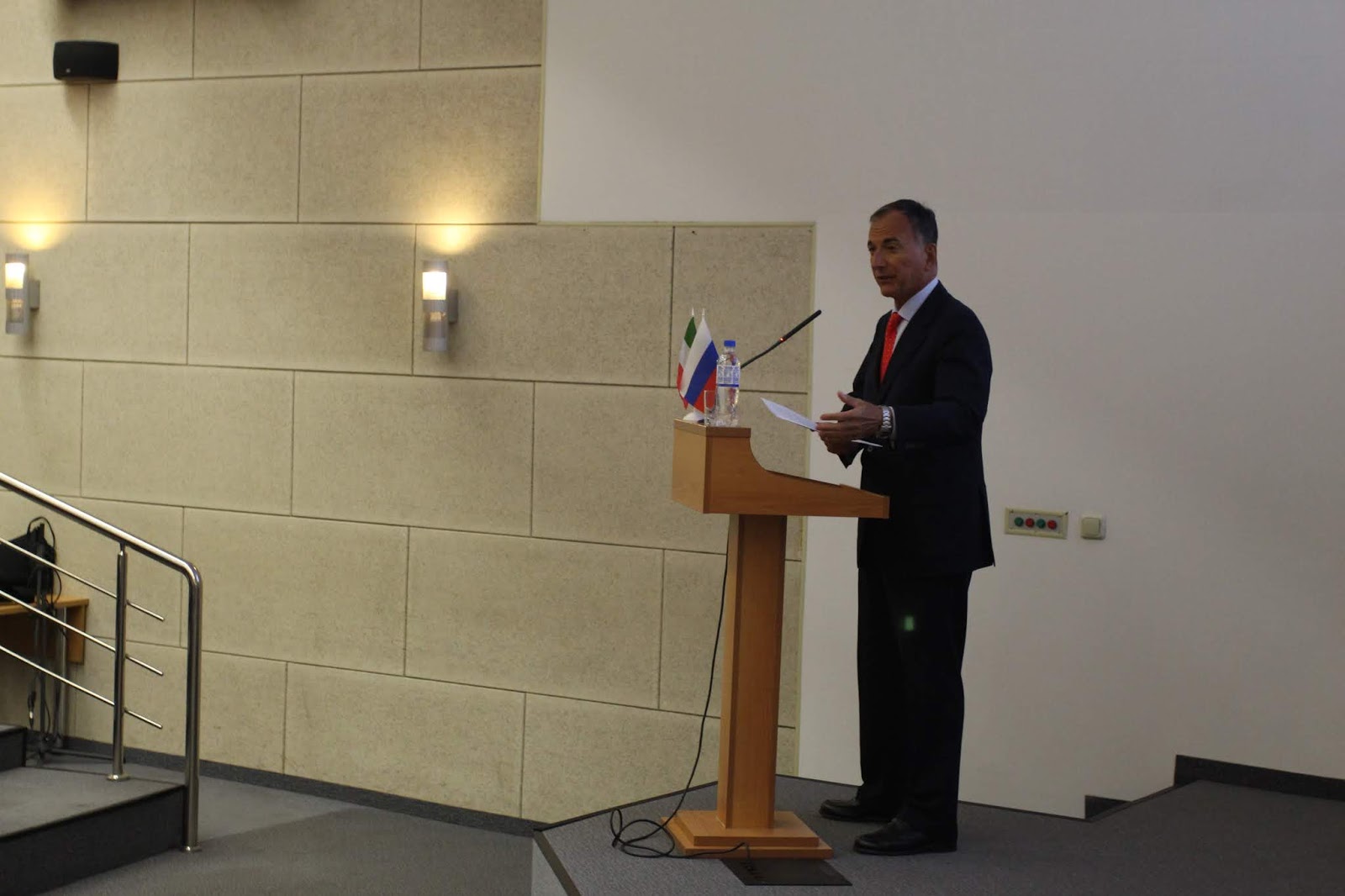
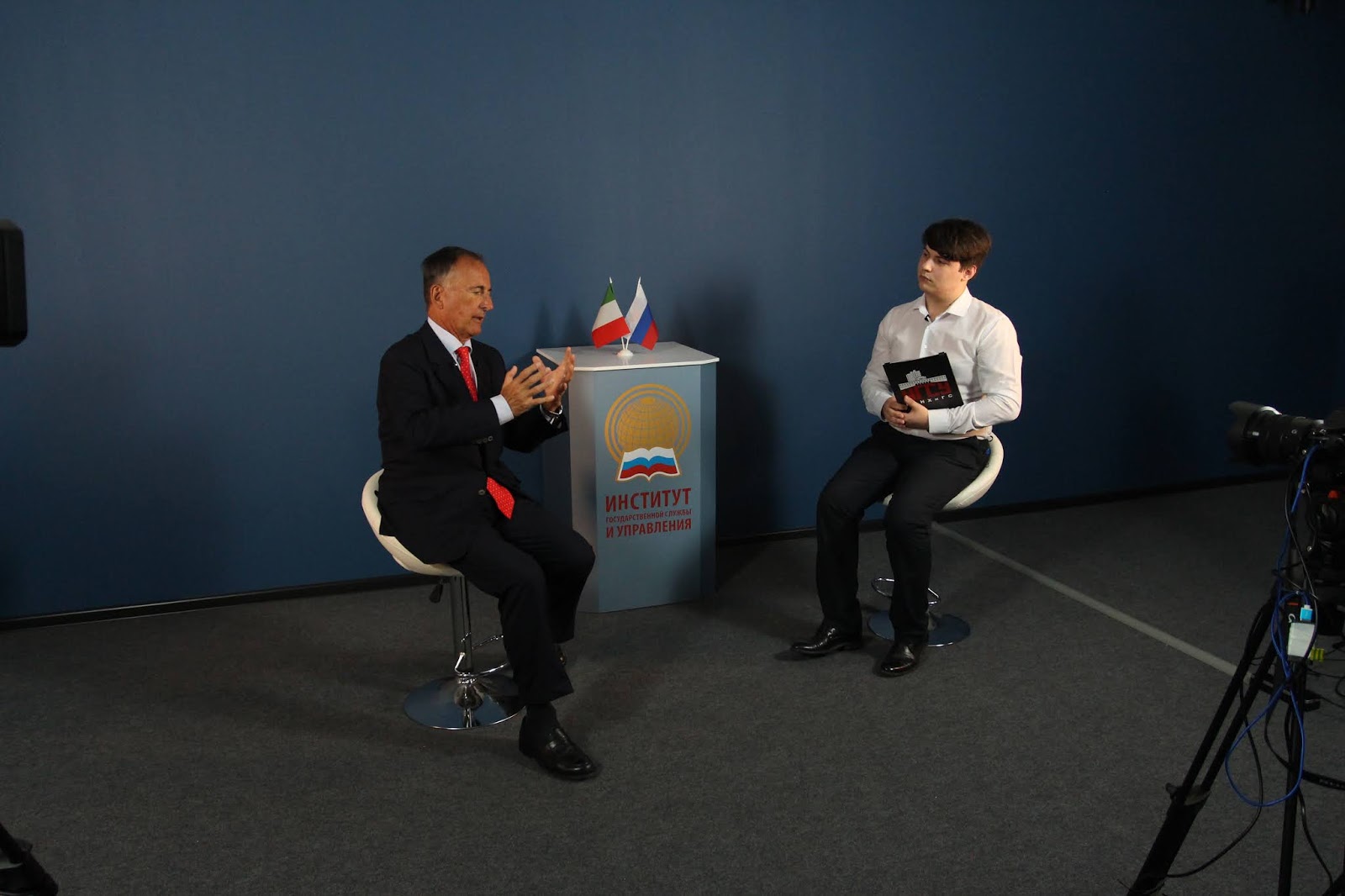
What unites Russia and EU is (much) more than what divides them
Lectio Magistralis
Prof. Franco Frattini
Moscow, 13 September, 2019
RANEPA, The Russian Presidential Academy of National Economy and Public Administration
I recall with a certain emotion when, in my quality of Foreign Affairs Minister of Italy, in 2002, I could attend an event that helped to make a step forward in the relations between the West and Russia. I’m referring to the historic handshake between President Putin and President Bush, under the auspices of the Italian Government of those days, which admitted Russia to be part of a NATO-Russia Council, thus breaking a cultural, historical, political and diplomatic wall.
Much more than seventeen years have gone since that far-away 2002. It seems an entire historical period has gone, and unfortunately, today we see as the reestablishment of relations, of a strategic partnership are both in a complex, difficult, in some ways even frozen phase. I’m referring to the strategy that has resulted in the introduction of sanctions against Russia and, of course, to the Russian answer to Europe.
If I go back to the origin of this crisis, namely the question of Ukraine, with the violent deposition of President Yanukovich, I think we should say that both sides – Ukraine and Russia – have made mistakes; but in my quality of European, of Italian citizen, coming from one of the founder countries of Europe, I am afraid I must say that big errors have been made by Europe. I also remember – I was then still Minister of Foreign Affairs – when in 2009 we celebrated the start of the so-called Eastern partnership, dedicated to Countries – such as the Ukraine, Moldova, Georgia – Europe had declared the intention of strengthening economic and political relations with; well, a failure of Europe dates back to that time, to the initial period of the Eastern partnership. And it’s a mistake that, speaking at that 2009 Summit, I had signalled.
Let me better explain. There was the temptation, maybe the tendency, and in any case we gave the impression, that Europe had created – through the Eastern partnership – a new fast track to the future adhesion of partners to the European Union and maybe even to NATO membership. After many years of negotiations for enlargement, following the success of the 2004 and subsequent enlargements, we gave the impression of wanting to overcome rules, procedures, policies, everything that we call « the acquis » – which any candidate State must reach – while indicating a new “political” process of accelerated accession.
Certainly this accelerated accession neither would nor should have ever been referred to as perspective. This primarily because there are procedures that all countries must respect. And secondly because, doing so, we gave the impression – and it’s an impression that surely did not correspond to the wishes of countries like Italy or France and Spain, which shared on this our same position – that this Eastern partnership was born and developed against Russia: not to cooperate but to counter. It appeared as a new containment policy that, extending to the future of NATO enlargement, certainly gave the impression the Europeans were not acting friendly toward Russia. A few years later, at the time of the negotiations for the signing of the agreement on cooperation and partnership between Ukraine and the European Union, once again that agreement was presented as an alternative arrangement in any Ukraine’s ability to continue to work on the East with its main strategic partner, Russia. In other words, it gave the impression that for some EU countries (but not for the others) the real political choice was that Ukraine was faced with an alternative: either you choose the signature with Europe, or you choose the alliance with Russia.
This alternative was wrong. I believe it is one of the causes of the crisis that followed, but today we have to analyse it calmly. Then, and it’s recent history, we saw the annexation of Crimea, the clashes in the Eastern provinces of Ukraine, and -as I said- errors by all the parties involved, up to the Minsk accords, which today constitute at the same time an objective and a start, because they establish the basis for commitments that must be fully respected on both sides.
I hope that President Zelensky is changing the Ukraine attitude to engage with Russia, maybe within the “Normandy format” to the full implementation of Minsk Agreement. The announced exchange of prisoners would be a much welcome first step. Italy’s position is known, and has been reiterated at the highest levels of the Italian Government. Italy accepted the sanctions policy against Russia for a duty of loyalty, in order to avoid splitting the unity of the European Union, and not because it was (or is) convinced that the way forward is that of economic sanctions, which, among other things, will damage some countries – first of all Italy -, much more than other EU countries.
Unfortunately, after some years, the Italian successive governments were not strong enough to pretend, at the moment of renewing the sanctions, a deep and substantial political debate, instead of confirming every 6 months. Italy believes that a policy of re-engagement of Russia as a strategic partner is not only necessary, not only urgent, but even indispensable for some major themes of global geopolitics.
And I’ll explain. Our world is going through global and globalized crisis that certainly we cannot solve if the Russian Federation (and incidentally China) are not fully involved along with the West. Russia has certainly a key role in the Syrian issue, because its strategic role and military presence and the strong results achieved against Daesh are well known; where, unfortunately, we must admit, with the policy of the international community we are leaving Syria in the drama, terror, despair of millions and millions of refugees.
Let’s look to North Africa, to Egypt, where Russia has been able to consolidate a strong presence, providing also with assistance and training to the Egyptian institutions, precisely at a time when some Western countries (but, I want to emphasize, this does not apply to Italy, which increased its relationships) had begun to abandon the current Egyptian Government, with the consequence of a greater fragility in that country. I think no one can deny how much more decisive a strong commitment of Russia in the UN Security Council would be, resulting in a more coordinated framework of solution for Libya, a country battered, divided, where the West thought they can do alone, while the Arab world is in its turn divided inside. The necessary consequence of all this is that, even today, the Security Council is unable to find a way to a resolution that will promote political unity, support, but also launch a serious offensive against terrorism and trafficking of human beings.
More generally, I see the need for a revival of our engagement with Russia; it is necessary to recreate a strategic partnership in order to counter the challenge to global security and to fight against terrorism, which means cyberterrorism, the so-called cyber-crime; which means economic terrorism, with the huge amount of funding that terrorism still succeeds in collecting through illegal trafficking; and, finally, pure and simple criminal terrorism, Daesh’s terrorism, which every day threatens to hit the heart of Europe, and in some case has already affected the European countries, and where – for reasons of convergence of interests – the Russian Federation has exactly our same interest in fighting terrorism before it reaches our homes. I know that the Minsk accords must be implemented; I know that the administrative decentralization of certain regions of Eastern Ukraine must be completed and strengthened to a structure whose virtuous example we Italians have in South Tyrol : the example of a really strong and advanced autonomy.
I know that there are still investigations and doubts about many victims on each side. All of that is well known. I am equally well aware, in my experience, of the institutional concerns of the Baltic countries, countries that suffered during the Soviet period, countries which aim more to a defence and to a containment rather than to a re-engagement of Russia. I understand these feelings. But I believe that feelings of this kind may be partially mitigated, compensated, looking at an even stronger interest: the global interest, the interest to deal with problems that are common to all of us. That interest, not the divisions, should prevail. I believe this is the meaning of leadership that we expect, that my country expects, that – I think – many Europeans expect from the European Union, its institutions, the Governments of the European countries and also by the Government of the Russian Federation. I see an even worse scenario, if really Trump’s administration will deepen the impact of the U.S. withdrawal from international treaties on non proliferation and arms reduction. I hope that president Trump will be able to react to those, in many American élites and circles, who are pushing him to another cold war era, including nuclear tests and deployment of missiles, that would be exactly the opposite of what the world of today needs.
It’s time for EU to first gradually review the sanctions-based policy vis-à-vis Russia. Maybe, making a first concrete step by re-opening channels and projects funding from the EBRD to the Russian small and medium enterprises, and so establishing a virtuous circle in view of lifting useless and – for EU and ITA – counterproductive sanctions. I think we should encourage President Trump’s proposal to invite back Russia to join G7, working again as G8 beginning with next year’s U.S. Presidency of G7. France was in favour during last month’s Biarritz G7, and Italy as well. Unfortunately, UK and Germany, because of their current political weakness, were unable to support that move. I hope that U.S. will insist.
The newly appointed Italian government would be surely in favour. I believe that, rather than repeating mutual accusations, rather than risking falling back into a terrible logic of a new Cold War, it would be good to put on the table, as I tried to do quickly, subjects on which there is a converging interest: our interest as Europeans, Russian friends’ interest, and the entire Western world’s interest, because America and Europe share a goal of global security which cannot be conflicting with the objectives of security which the Russian Federation pursues against drug trafficking or arms trafficking or in contrast to nuclear proliferation. Russia as part of global solution: this should be a key, provided that in the West there are leaders strong enough to elaborate on that principle. These are truly global objectives, because they are goals corresponding to the rules, the founding principles of the United Nations themselves.
I think today everyone must rethink the logic of confrontation and revive the logic of collaboration, being obviously ready to report when one or the other should let down a transparent sincere and loyal collaboration.
Thank you very much.
